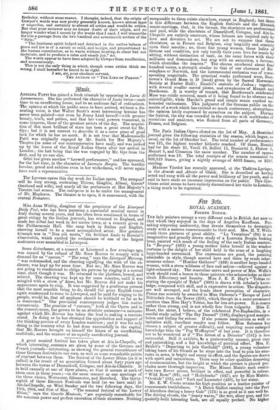A great musical festival has taken place at Aix-la-Chapelle, of
which interesting.aceounta are given by some of the German and French journals—interesting, as showing the general resemblance of these German festivals to our own, as well as some remarkable points of contrast between them. The festival of the Lower Rhine (as it is called) is the result of an association formed about forty years ago between the towns of Dusseldorf, Cologne, and Aix-la-Chapelle. It is held annually at one of these places, so that it occurs at each of them once in three years ;--in the same manner as our meetings of the three choirs, Worcester, Gloucester, and Hereford. The thirty- eighth of these Rhenish Festivals was held (as we have said) at Aix-la-Chapelle, on Whit Sunday and the two following days, the 19th, 20th, and 21st of May. "The musical festival of the Lower Rhine," says the Gazette Musicale, "are especially remarkable for the sonorous power and perfect execution of their choruses. Nothing comparable to them exists elsewhere, except in England; but there is this difference between the English festivals and the Rhenish music-meetings, that, in the former, the choristers are professional and paid, while the choristers of Dusseldorf, Cologne, and Aix-la- Chapelle are entirely amateurs, whose labours are inspired only by love and devotion to art. We are not to suppose that the choristers, as in France and Belgium, sing languidly and scarcely open their mouths ; no, these fine young women, these ladies of fortune and condition, not only testify their pure love for music by sitting, without distinction of rank, on the same forms with their milliners and dressmakers, but sing with an animation, a fervour, which electrifies the hearers." The chorus numbered about four hundred voices, a strength similar to that of our choruses of Bir mingliani or Norwich, and the instrumental orchestra was of corre- sponding magnitude. The principal works performed were, Beet- hoven's Grand Mass in D (lately given by the Sacred Harmonic Society at Exeter Hall) ; Handel's oratorio of Joshua ; together with several smaller sacred pieces, and symphonies of Mozart and Beethoven. It is worthy of remark, that Beethoven's celebrated Mass was coldly received, much of it being found to be obscure and unintelligible, while Handel's grand and simple music excited un- bounded enthusiasm. This judgment of the German public on the merits of a work which has excited so much controversy, strengthens the opinion lately expressed by ourselves on the subject. During the festival, the city was crowded in the extreme with multitudes of musicians and amateurs, who flocked from all parts of Germany., France, and Belgiuni.






























 Previous page
Previous page